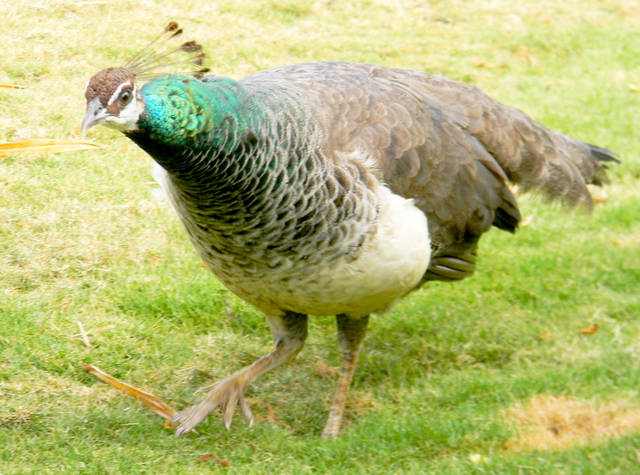When unrelated subjects collide in time through a special window of vision, the interconnection is obvious to the person who experiences the epiphany. This happened to me again lately, bringing a peacock, a riveting tale of migrants, and my neighborhood roosters (and their hens) into the mix.
Totally unrelated subjects are regularly woven together by the novelist Clive Cussler, a master at plotting. This writer doesn’t expect to get a bestseller out of “Peacocks, migrants and roosters.” However, as I focus this column I hope to lead readers to explore stand-out moments in time of their own.
What could peacocks, migrants and roosters have in common? Obviously, two of them are birds. The third, migrants, might be somewhat relative, since all three are on the move.
In reading about Storybook Theatre’s October Kaiulani Festival for Kauai children, I was reminded how the young princess had admired the jeweled tones of peacock feathers; something I, too, have thought beautiful and display in our home. A while back, we were visited by a malihini (newcomer) peacock on the move. More on him soon.
Coming home from a beach-side picnic with some bookish friends, we found “our” splendid rooster and his court encamped in the shade enjoying a picnic of their own. My thoughts were on part of our lunchtime conversation on migrants, or immigrants, and the transitory and difficult nature of their lives.
This stemmed from the loaned book I’d returned, “Exit West.” Now, here were our feral chicken migrants, who move from tree to tree, yard to yard.
The local fowl encampment ignored us as we unpacked the car. We figured they were content with their grazing, replete with fruit and maybe few beetles and centipedes. Within a quarter of an hour, they were off after group-crowing led by Mr. Resplendent Feathers, the head “roostah” guy.
That afternoon’s mail brought us a note from a family member who wrote of disquietude caused by the realization that many beloved people were dying or would soon die — the impermanence of life. Impermanent.
I searched the definition in the Oxford Dictionary I keep handy on my desk: “the state one enters when one is transitory; not permanent; transient, temporary, just passing through.” Somehow that brought my three quite unrelated subjects together.
Like us, as seniors now — who had just attended a seminar for retirees focused on the “Go-Go,” the “Slow-Go,” and the “No-Go” times, and how to plan for them. Like those “cheekens” through our garden. And like the transient peacock who attempted to move into our neighborhood after being spotted on the upslope of Kuamoo Road.
This runaway (no doubt) from Smith’s Gardens at the Wailua River mouth was treated horrendously by the neighborhood “local” free-ranging fowl. He was just too different. I mean, really, whom did he think he was, coming into this area where he didn’t belong? (While he was being shunned, that particularly grand fellow gave me the opportunity of photographing him.)
In “Exit West,” a brilliant story unfolds about a young couple who must leave their birth country. Danger threatens from militants who have overtaken it, causing turmoil and shutting doors to opportunity. The two are lucky to find an exit that lands them in a camp of migrants on Mykonos, that sparkling Grecian island. Refugee experiences are far from “sparkling.” Their next exit is to London.
As immigrants under fire from police, they and their kind are seen as The Other by the local populace and rounded up into work camps to build roads, bridges, housing. Exiting once again, they land in Marin, in the Bay Area near San Francisco. The woman of the tale finally realizes that all people are migrants in their lives.
We are all constantly giving up something and moving on, even if not in a geographical move, because of the time-line aspect of life itself. In our present world as in Mohsin Hamid’s book described, the camps are split between those who seek the right of passage and those who would deny them this right.
Then there are those who defend the rights of the seekers. The story’s Marin camp flowers through creativity as life continues and the migrants find things to do and ways to bond, love and live. A new way of life unfolds.
Deep thoughts are woven into this story; certain parts read like pure poetry. “All over the world people were slipping away from where they had been …” Plains crack in drought, tides engulf seaside homes, cities jam, battlefields are bloodied. People slip away, too — “people they had in some cases loved.”
As for impermanence, it’s been said many times that life becomes all the more valuable when its end is at hand. For some people, when the idea of being finite as a human is grasped, then the everyday events of life are transformed from ho-hum.
•••
Dawn Fraser Kawahara, author and poet, made her home on Kauai in the 1980s. She and her husband, a retired biology teacher, live with books, music and birds in Wailua Homesteads. Kawahara’s neighborhood rooster and gang star in her poem published recently in Bamboo Ridge Issue #10. The writer’s books may be found in local outlets and on Amazon. For further information, e-mail tropicbirdpress@gmail.com.




